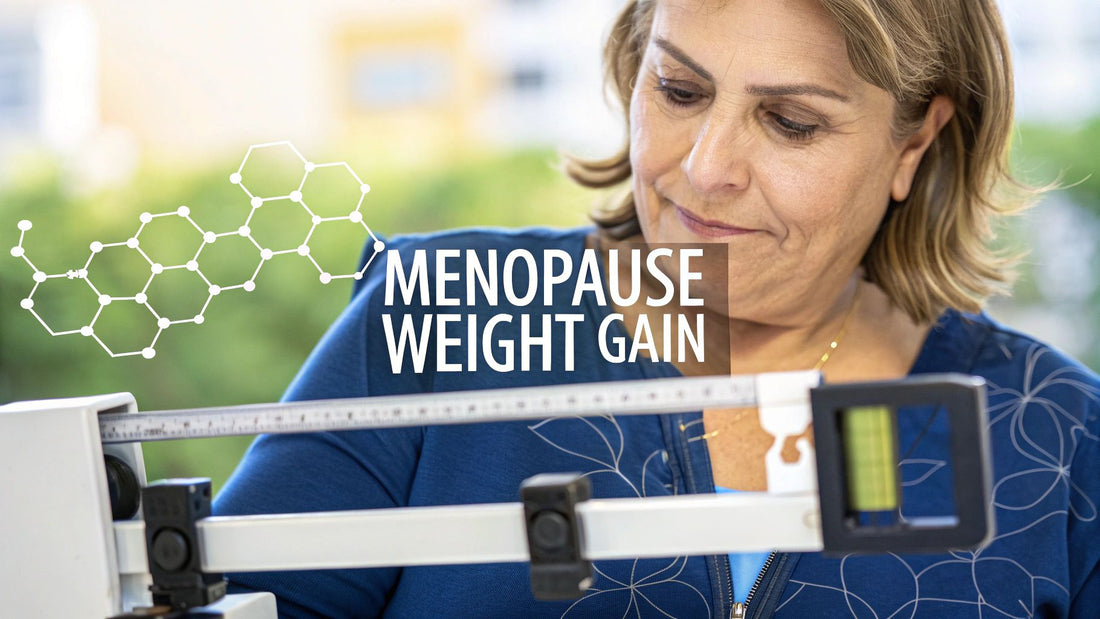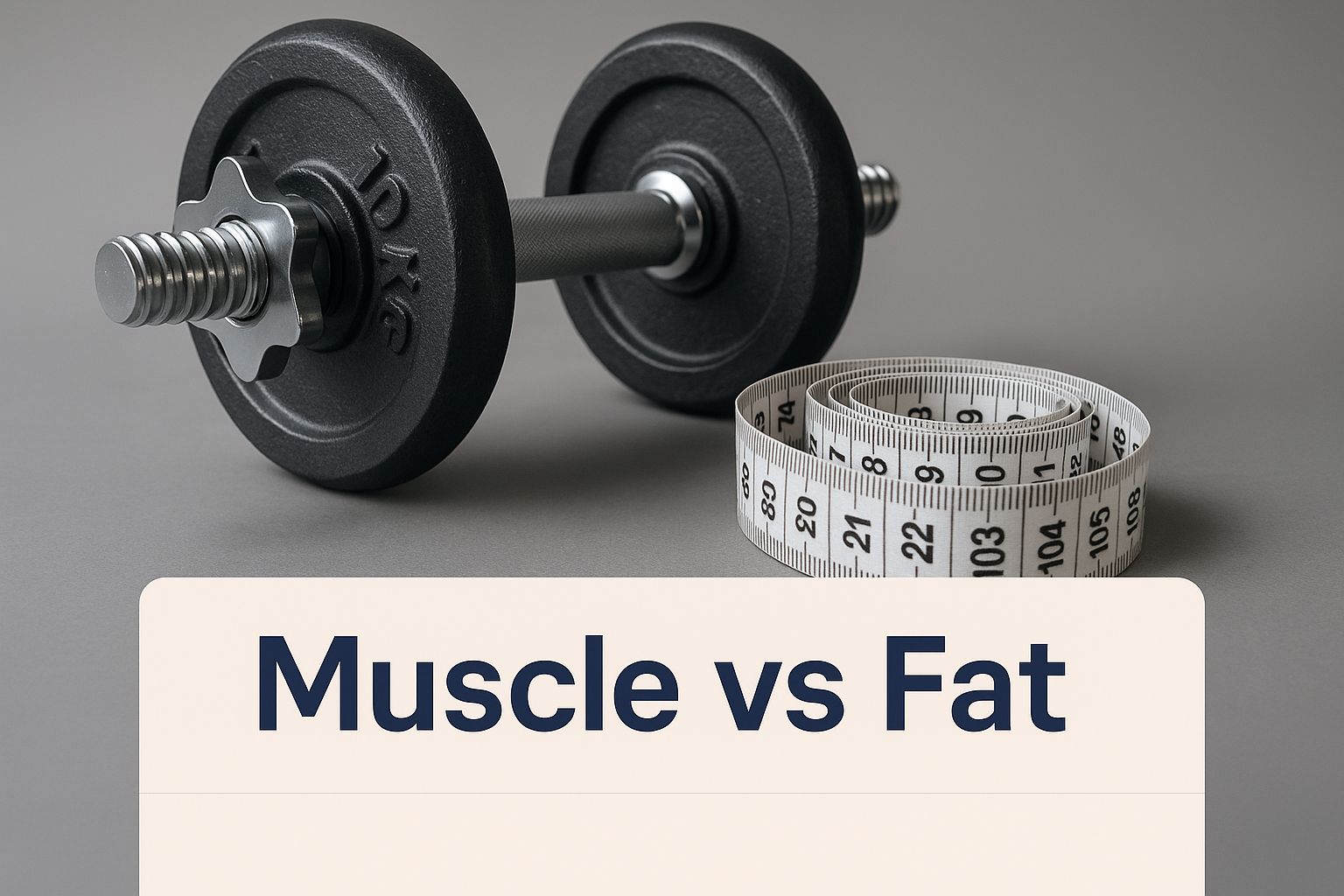
Understanding Menopause Weight Gain Causes
Share
It’s a frustratingly common story: the pounds start creeping on during menopause, and nothing you do seems to stop them. But this isn't about willpower. It's about deep, biological shifts happening inside your body—changes in your hormones, your metabolism, and even where you store fat.
Understanding these causes is the most powerful first step you can take to feel in control again and build a life of health and longevity.
Why Managing Your Weight Feels Different Now
Do your go-to diet and exercise routines suddenly feel useless? You are not alone. So many women find that the exact same habits that kept them healthy for decades just stop working during the menopausal transition. It's easy to feel discouraged and start blaming yourself.
But the truth is, this isn't a personal failure—it’s a complex biological event. Think of it like your body's internal operating system getting a massive software update. The old rules don't quite apply anymore, and your approach to healthy living needs an update, too.
The Real Drivers Behind the Change
The shift you're feeling is a perfect storm of factors that team up to make weight management a whole new ballgame. Once you understand what’s really going on under the surface, you can start building a new, smarter strategy for your health.
Here are the key changes happening inside your body:
- Hormonal Fluctuations: As estrogen levels drop, your body’s entire system for regulating metabolism and appetite gets thrown off kilter.
- Slowing Metabolism: As we age, we naturally lose muscle mass. Since muscle burns calories, this means our bodies burn fewer calories, even when we’re at rest.
- Shifts in Fat Storage: Those same hormonal changes signal your body to start storing fat around your midsection, which brings its own unique health challenges.
The goal here is to trade frustration for empowerment. Once you understand that your body is just following a new biological map, you can start adapting your lifestyle to support it.
This transition requires a new playbook. The great news is that with the right knowledge, you can absolutely navigate this phase with confidence. Many women find tremendous success by adjusting their approach, and you can learn more about specific strategies in our guide on how to lose weight over 50.
Knowing the real causes of menopause weight gain helps you focus your energy on what actually works now. This isn't about dieting harder; it's about working smarter with your body.
How Hormonal Shifts Affect Your Metabolism
To get to the heart of menopause weight gain, we have to talk about hormones. For years, estrogen acted like your body’s master metabolic controller, telling it how to use energy and where to store fat. It was a reliable system that kept things running smoothly.
But as you enter the menopausal transition, declining estrogen levels disrupt this delicate balance. Think of it like someone turning down your body's internal thermostat. This fundamental shift means your body naturally starts burning fewer calories throughout the day.
The Estrogen Drop and Your Metabolism
The main reason for this is that your basal metabolic rate (BMR)—the energy your body uses just to stay alive—starts to slow down. When estrogen was plentiful, it helped keep that internal engine revving high. With less of it around, the engine idles lower.
Suddenly, the same amount of food you’ve always eaten can start to cause weight gain. It’s not that your habits changed; it’s that the underlying rules your body plays by have been completely rewritten.
How Fat Storage Patterns Change
It isn’t just about a slower metabolism. It’s also about where your body decides to put that extra fat. Estrogen used to guide fat deposits to your hips, thighs, and butt. As estrogen levels fall, other hormones—specifically androgens—gain more influence. Their signal is different: store fat centrally.
This shift creates a noticeable change in your body shape.
- Increased Abdominal Fat: Your body starts prioritizing fat storage around your midsection, leading to what many call "menopause belly."
- Loss of Lean Muscle: These hormonal changes, paired with the natural aging process, make it much harder to build and maintain calorie-burning muscle mass.
- Metabolic Risks: This new fat distribution, particularly the visceral fat around your organs, is tied to more significant health risks down the road.
This isn't just a cosmetic issue. The decrease in estrogen favors fat accumulation in the abdominal area, which is associated with increased cardiovascular and metabolic risks. You can read more about these metabolic changes and their health implications.
Your body is essentially being reprogrammed, which means your approach to managing your health needs an update, too. For many women, this is the perfect time to explore new wellness strategies that work with their changing body, not against it.
If you're exploring options, our guide on how GLP-1 medications can assist with weight management provides helpful information on modern approaches like GLP-1 treatments that can support your journey.
The Truth About Muscle Loss and Belly Fat
During menopause, the number on the scale doesn't tell the whole story. What's really happening is a fundamental shift in your body composition—a change in what you're losing and where you're gaining. This internal reorganization is a key driver of menopausal weight gain and directly impacts your metabolism and long-term health.
Two things are happening at once: you’re losing metabolically active muscle, while your body starts storing a more dangerous type of fat right around your middle.
The Problem with Losing Muscle
We all experience some muscle loss as we get older, a process called sarcopenia. But during menopause, hormonal changes can accelerate this process. This is a big deal because muscle is your body’s metabolic powerhouse.
Think of your muscle tissue as a 24/7 furnace, constantly burning calories. The more muscle you have, the hotter that furnace burns and the higher your resting metabolism. As you lose muscle, your furnace dials down. Your body simply doesn't need as many calories, which is why you can gain weight even if your diet hasn't changed.
It's a double whammy: losing muscle slows your metabolism and makes your body less efficient at managing blood sugar, which can set the stage for even more fat storage.
Why Belly Fat Is a Bigger Concern
While you’re losing muscle, those same hormonal shifts are telling your body to store fat in a new way. Before, fat might have settled on your hips and thighs. Now, it has a new favorite spot: your abdomen. And this isn't just the soft, pinchable fat (subcutaneous fat) that sits right under your skin.
We're talking about an increase in visceral fat. This is a more concerning type of fat that wraps itself deep inside your abdomen, cushioning your internal organs. Visceral fat is metabolically active, releasing substances that can create inflammation and disrupt your body's systems.
This infographic helps put the muscle vs. fat difference into perspective.

As you can see, maintaining muscle isn't just about strength—it’s a key strategy for healthy aging and longevity.
How Your Body Composition Changes During Menopause
| Factor | Pre-Menopause | Peri/Post-Menopause |
|---|---|---|
| Estrogen Levels | High and stable | Declining and fluctuating |
| Fat Storage Pattern | Primarily on hips, thighs, and buttocks (subcutaneous fat) | Shifts to the abdomen (visceral fat) |
| Muscle Mass | Relatively stable, easier to maintain and build | Natural decline (sarcopenia) accelerates |
| Metabolic Rate | Higher, supported by greater muscle mass | Decreases due to muscle loss |
| Insulin Sensitivity | Generally higher and more stable | Tends to decrease, leading to insulin resistance |
This shift toward more visceral fat and less muscle directly impacts your health by:
- Increasing Insulin Resistance: Your body struggles to manage blood sugar effectively.
- Elevating Health Risks: The odds of developing conditions like heart disease and type 2 diabetes go up.
- Driving Inflammation: Contributing to chronic, low-grade inflammation.
This is exactly why strength training becomes non-negotiable during this phase of life. Building and preserving muscle is your best defense against a slowing metabolism and the accumulation of harmful belly fat.
If you're ready for a comprehensive strategy to manage these changes, take our quiz to see if you are a candidate for a personalized plan that supports your journey.
How Your Daily Habits Can Make Things Worse
While hormonal shifts set the stage for weight gain during menopause, our day-to-day habits can either help or hinder our progress. Think of it as a tangled web where stress, sleep, and physical activity are all connected. When one of those threads gets pulled, it can easily unravel the others, making weight management feel like an uphill battle.
The good news? You have control over these lifestyle factors. Understanding how they influence each other is the first step toward creating a plan that truly supports your body.
The Cortisol-Belly Fat Connection
Midlife can be a stressful time, from demanding careers to caring for family. When you’re constantly stressed, your body pumps out the hormone cortisol.
In small doses, cortisol is fine. But when it’s constantly elevated, it sends a powerful signal to your body: "Store fat! Especially around the middle!"
This is the very same visceral fat we talked about earlier—the dangerous kind that wraps around your organs. So, that feeling of being overwhelmed isn't just in your head; it’s actively working against your weight management goals.
Why Poor Sleep Sabotages Everything
If there's one thing menopause is famous for, it's disrupting a good night's sleep. Hot flashes, night sweats, and anxiety can turn your bed into a battleground. Unfortunately, that lack of quality sleep does more than just make you tired. It throws your appetite-regulating hormones completely out of whack.
- Ghrelin Skyrockets: This is your "go eat" hormone. When you're sleep-deprived, ghrelin levels shoot up, making you feel ravenously hungry.
- Leptin Plummets: This is your "I'm full" hormone. When leptin levels drop, your brain never gets the memo that you've had enough, making it easy to overeat.
This hormonal one-two punch creates a perfect storm for weight gain. You're hit with intense cravings for sugary, high-carb foods for a quick energy fix, while having no energy for exercise. It's a vicious cycle that can be hard to break.
It's not a lack of willpower; it's biochemistry. Your body is biologically wired to seek out quick energy when it's exhausted.
By getting a handle on these lifestyle factors, you can dramatically soften their impact. Simple shifts like creating a consistent bedtime routine and practicing stress-reduction techniques can help get cortisol under control and improve your sleep. This creates a positive ripple effect for your entire well-being.
For women looking to give their body an extra boost at the cellular level, exploring supportive therapies like NAD+ treatments can also be a powerful tool for enhancing energy and vitality.
Ready to figure out a personalized plan to tackle these challenges? Take our quiz and discover a path forward that finally works with your body.
A New Playbook for Weight Management

When you consider all the hormonal and metabolic curveballs menopause throws, it becomes clear: the old rules for weight loss no longer apply. What worked in your 30s can feel completely useless now.
It’s time for a new playbook—one that works with your body’s new biology instead of against it. This is about making smart, strategic shifts that support your long-term health and longevity.
The goal is to pivot from just "losing weight" to building a stronger, more resilient, and metabolically healthy body. Once you grasp why the weight is showing up, you can build an empowering, sustainable plan that puts you back in the driver's seat.
Prioritizing Protein and Fiber
Your approach to food needs a rethink. Slashing calories can backfire by slowing your metabolism even further. A smarter strategy is to focus on nutrient-dense foods, especially protein and fiber.
Protein is your number one defense against age-related muscle loss. Getting enough protein with every meal helps you feel full and satisfied, keeps blood sugar stable, and gives your body the raw materials to hold onto that precious muscle.
Fiber is the other unsung hero. It fosters a healthy gut, smooths out blood sugar spikes, and keeps you feeling full, which makes it much easier to manage your overall intake without feeling deprived.
Combining Strength and Cardio
Your workouts need to evolve, too. While cardio is fantastic for your heart, strength training becomes the star of the show during menopause. Lifting weights or doing bodyweight exercises sends a loud signal to your body: build and maintain muscle.
More muscle means a higher resting metabolism. It directly fights back against the metabolic slowdown that comes with this stage of life.
A smart, well-rounded plan includes both:
- Strength Training (2-3 times per week): Focus on compound movements that work multiple muscle groups to build functional strength.
- Cardiovascular Exercise (150 minutes per week): Activities like brisk walking, swimming, or cycling are crucial for heart health and are amazing stress-busters.
This one-two punch is a powerful tool for changing your body composition and firing up your metabolism. To dive deeper, check out our guide on how to lose weight during menopause.
Studies show that women gain about 1 to 1.5 pounds per year on average during this transition, with fat accumulating in the abdominal region. This makes proactive lifestyle changes even more critical.
Modern Support for Lasting Results
Building these lifestyle habits is the foundation for success. But for many women, the biological hurdles are high, and extra support can make all the difference. Modern wellness solutions like GLP-1 medications can offer targeted help, assisting with appetite control and metabolic health when diet and exercise aren't enough on their own.
A proactive approach means accepting that your body has changed—and that your toolkit for managing it needs to change, too.
This new playbook is all about creating sustainable habits for results you can maintain. If you're ready to explore a personalized approach, take our quiz to see how Blue Haven Rx can support your journey toward better health and longevity.
Charting Your Course with Confidence
If you've been struggling with weight gain during menopause, it's easy to feel like you're fighting a losing battle. But the truth is: this isn't about a lack of willpower. It's about biology. You’re dealing with a powerful combination of hormonal shifts, a slowing metabolism, muscle loss, and the real-world pressures of midlife.
Understanding these root causes is like finally getting the right map for the territory you're in.
Armed with this knowledge, you can finally stop fighting against your body and start working with it. And you are far from alone. Globally, over 43% of menopausal women live with obesity, and some studies show that up to 20% of women gain more than 10 pounds during this time. You can learn more about the global data on menopausal weight changes to see the bigger picture.
This isn't an ending; it's a new chapter—one where you can be proactive and optimistic. By understanding how your body is changing, you can manage your weight, protect your health for the long haul, and feel strong and vibrant.
Ready to create a plan that truly understands your body's needs right now? Take our quiz to see how Blue Haven Rx can help.
Your Questions, Answered
Going through menopause often feels like your body is playing by a new set of rules, which can bring up a lot of questions about weight. Here are some of the most common concerns.
Is It Impossible to Avoid Menopause Weight Gain?
Not at all. While the hormonal changes make it easier to gain weight, it’s not inevitable. Think of it as your body’s operating system getting an update—you just need a new user manual.
The key is realizing that what worked in your 30s probably won't cut it anymore. Your new strategy should focus on building muscle, packing your diet with protein, and managing stress. These steps directly counter the metabolic slowdown that comes with menopause.
Why Is All the Weight Going Straight to My Belly?
This is one of the most frustrating shifts, and you can thank your hormones. It's all about the changing influence of estrogen.
Before menopause, estrogen tended to direct fat storage to your hips and thighs. But as estrogen levels plummet, other hormones—specifically androgens—have a louder voice. These androgens tell your body to start storing fat right around your midsection. This isn't just a cosmetic issue; this deep abdominal fat, called visceral fat, is riskier for your long-term health.
Can I Actually Lose Weight During Menopause?
Absolutely! It might feel harder, but it is 100% possible to lose weight during and after menopause. The secret is to stop thinking only about cutting calories and start focusing on improving your overall metabolic health.
This means shifting your priorities. Strength training becomes non-negotiable for building metabolically active muscle, and a protein-rich diet is crucial for staying full and fueling those muscles. For women who need more support, modern wellness solutions can be a game-changer. You can find out more by learning about how to qualify for GLP-1 programs.
Ready to feel in control of your health again? At Blue Haven Rx, we provide personalized plans that work with your body's unique needs. Start your journey today by taking our quick quiz.